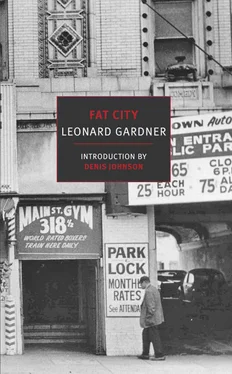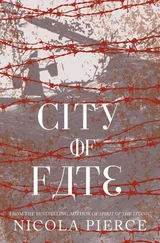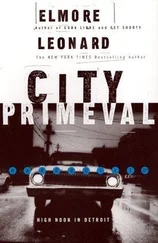Leonard Gardner - Fat City
Здесь есть возможность читать онлайн «Leonard Gardner - Fat City» весь текст электронной книги совершенно бесплатно (целиком полную версию без сокращений). В некоторых случаях можно слушать аудио, скачать через торрент в формате fb2 и присутствует краткое содержание. Год выпуска: 2015, Издательство: NYRB Classics, Жанр: Современная проза, на английском языке. Описание произведения, (предисловие) а так же отзывы посетителей доступны на портале библиотеки ЛибКат.
- Название:Fat City
- Автор:
- Издательство:NYRB Classics
- Жанр:
- Год:2015
- ISBN:нет данных
- Рейтинг книги:5 / 5. Голосов: 1
-
Избранное:Добавить в избранное
- Отзывы:
-
Ваша оценка:
- 100
- 1
- 2
- 3
- 4
- 5
Fat City: краткое содержание, описание и аннотация
Предлагаем к чтению аннотацию, описание, краткое содержание или предисловие (зависит от того, что написал сам автор книги «Fat City»). Если вы не нашли необходимую информацию о книге — напишите в комментариях, мы постараемся отыскать её.
Fat City — читать онлайн бесплатно полную книгу (весь текст) целиком
Ниже представлен текст книги, разбитый по страницам. Система сохранения места последней прочитанной страницы, позволяет с удобством читать онлайн бесплатно книгу «Fat City», без необходимости каждый раз заново искать на чём Вы остановились. Поставьте закладку, и сможете в любой момент перейти на страницу, на которой закончили чтение.
Интервал:
Закладка:
He revived standing on the sidewalk holding on to a windowsill. He tried to tuck in his shirttails, forgot them, took a resolute step and in a forward plunge was running, striving to stay up, afraid of the damage of falling, then not caring. He struck the pavement face-down and lay for a moment feeling an odd pride that it had not hurt. When he rose he discovered blood running from his nose. Sitting in a windy doorway, he stanched the flow with his handkerchief. Cars splashed by, figures ran past, neon flickered in the rain. Tully rose and with a hand on walls and windows he progressed down the sidewalk to the corner, where he stood awhile before venturing diagonally across the street amid sounding horns and on to the Azores Hotel. He was stopped at the office at the head of the stairs by the red-faced clerk.
“Want something?”
“Just going to my room.”
“You don’t have no room here.”
“I was here last night.”
“So where’s the rent for tonight?”
“Pay you in the morning.”
The clerk motioned toward the stairs.
“Just want to go to my room.”
“Get out of here.”
“Don’t tell me to get out, you son-of-a-bitch. You talking to me like that?”
“Go on, get moving.”
“Don’t you tell me to get moving. You don’t tell me nothing.”
Tully went back down the stairs and into the rain. Midway in the next block, in the dark recessed entrance of a store, he stumbled against something and was kicked. Cursing, he backed away and sat down on the concrete.
“I’ll cut your throat,” said the man farther inside. “I got your number. I’m wise to you. Keep your hands off me. You come back here again I’ll stick you.”
“I’ll come back and kick the shit out of you, you don’t shut up.”
“I’m ready for you.”
Rain was blowing in on Tully, and after judging that he had remained long enough to show the other that he was not intimidated, he got up and tried the doors of several parked cars.
On a dark quiet street, in an asphalted loading area strewn with refuse, Tully came upon a great steel incinerator. Cylindrical, the chamber rose well above his head, funneling up to a flue. He had noticed its thick silhouette against the wall of the supermarket, and now in the beat of the rain he felt around its rusty surface and found the door. He swung it open, leaned in and his hand contacted cardboard cartons.
“Who’s in there?” He climbed in. Under a soft ringing he felt around, clearing a place for himself among crates and boxes and finding a quantity of shredded paper. This he threw to the center, where the chamber’s breadth permitted him to lie full length, and he settled into it with a groan of relief. But he was in a draft. He crawled to the square of dim light, thrust his arm out into the rain and pulled the door almost shut. The chamber now was completely dark. He lay back and burrowed into the paper. Once he thought he heard a truck grinding by, but then he was riding it himself, going somewhere down a long straight road.
He was sick, overcome by repugnance and despair. Aware of nudgings against his foot, he opened his eyes to muted daylight and had no understanding of where he was. Facing him in a rectangle of light was the upper half of a young Chinese in a green smock.
“Come on. Out. I got trash to burn.”
“Who the hell are you?”
“Come on. What you think this is, a motel or something? Get out.”
“Don’t tell me what to do.”
“Come on, come on. You crazy? You’re going to get killed some day, you don’t watch it. Get out. What’s the matter with you? You don’t even want to move when somebody’s going to light a fire under you? You going to lay there and argue?”
Tully rose, his feet sinking, and he climbed out the door. Squinting irritably, he cleared his throat, spat, leaned forward and with the aid of a finger blew one nostril and then the other. Crinkled strips of white paper clung to his clothes. The rain had stopped. It was early morning, cold and cloudy. The young man in the grocer’s smock began throwing cartons into the incinerator.
That afternoon Tully arrived at the gym. There were bloodstains on his jacket; he was dirty and unshaven, and it was all the fault of a lousy hotel clerk, he said, an explanation that did not lessen the anger in Ruben’s eyes.
“Where the hell have you been?”
“I got locked out of my room.”
“Why haven’t you been down here?”
“I would have been. I’m ready to start training but I don’t have my stuff. I don’t have the money to get my bags out of hock. What can I do?”
Ruben gave him a dollar and told him to wait, and after Tully had eaten hamburgers and drunk a milk shake standing in the gym, and after he had showered and waited until the last boxer had gone back to the locker room, Ruben drove him to the Owl Hotel and redeemed his bags.
“I’ll be at the gym training tomorrow,” Tully promised out on the sidewalk, and Ruben gave him fifteen dollars.
Tully went to bed early that night, full of chicken-fried steak and mashed potatoes, and hearing the sounds of the street, he drifted in the darkness with his loss.
23
The rains ceased; new green leaves covered the elms and sycamores lining residential streets. When a haze of peat dust again hung over the town, Luis Ortega told Ruben that he had talked with Tully. Ruben had not seen Tully since he had given him those fifteen dollars, an error he still regretted. Tully had said he was working as a cook, Ortega reported, but his face was dirty and there was a straw hat on the bar. He had talked about getting into shape.
As summer approached, hundreds of men were again on El Dorado Street, leaning against storefronts, cars and parking meters; and Ruben, passing from his house to the port and from the port to the gym, looked among them for Billy Tully. He did not expect to see him. When Tully wanted to fight again, Ruben believed he would come back to the gym. Until he did, he could only wait. But he did not hope. He had given up on him once already and been disappointed by too many others. As if in rebellion against his influence, they had succumbed to whatever in them was weakest, and often it was nothing he could even define. They lost when they should have won and they drifted away. Over the years he would see one around town. A few he read about in the newspaper — some fighting in other towns for other managers, one killed on a motorcycle, one murdered in New Orleans. They were all so vulnerable, their duration so desperately brief, that all he could do was go on from one to another in quest of that youth who had all that the others lacked. There was always someone who wanted to fight. He had Ernie Munger, Buford Wills and Wes Haynes; Luis Ortega was back in training, and so Ruben went on.
Ortega had once been a middleweight. With his shoulders hunched around his ears, his chin on his chest, he had stalked, flatfooted and perpetual, through round after round of punishment and won a string of main events by knockouts. Between bouts he had gone to fat. Unequal finally to the added effort and deprivations of conditioning, he had retired. When he returned to the gym, encouraged — Ruben knew — by Tully’s victory over Lucero, Ortega was fifty pounds overweight.
Ortega’s face was bloated. His sharp-bridged nose curved sideways, his arched brows were split, and he kept an impeccable mustache. On the backs of his plump hands were old homemade tattoos, faded pachuco crosses. His belly and buttocks wrapped in sheets of plastic under a bleach-spotted sweat suit, a pair of tight trunks over the pants and a terry-cloth bathrobe over everything, his great chin jiggling, he produced an abundance of grunts and sweat, but it was clear to Ruben that Ortega would never be a middleweight again. At last he matched him with a young heavyweight in Salt Lake City, securing a preliminary bout for Ernie Munger, who was back in the gym after an absence of several months. Five days before the fight, Ortega, weakened by steam baths, came down with flu. Ruben phoned for a postponement, but Ortega was replaced by a substitute. Now there were no longer travel expenses for three; there was only bus fare for Ernie.
Читать дальшеИнтервал:
Закладка:
Похожие книги на «Fat City»
Представляем Вашему вниманию похожие книги на «Fat City» списком для выбора. Мы отобрали схожую по названию и смыслу литературу в надежде предоставить читателям больше вариантов отыскать новые, интересные, ещё непрочитанные произведения.
Обсуждение, отзывы о книге «Fat City» и просто собственные мнения читателей. Оставьте ваши комментарии, напишите, что Вы думаете о произведении, его смысле или главных героях. Укажите что конкретно понравилось, а что нет, и почему Вы так считаете.












